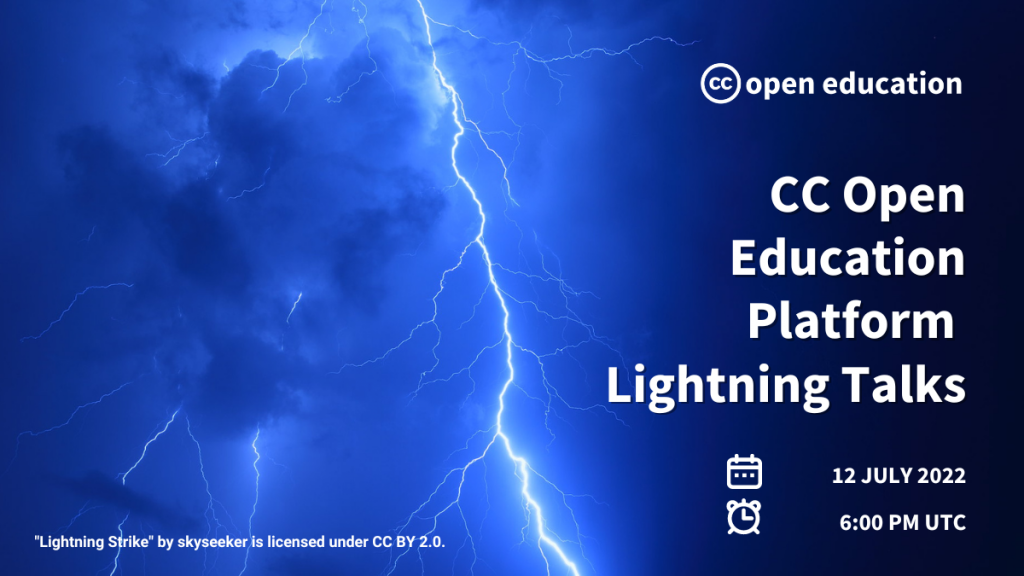CC Open Education Platform Lightning Talks: Recordings and Request for Speakers!
mercredi 10 août 2022 à 13:48The Creative Commons Open Education Platform community completed our latest round of Lightning Talks, or seven-minute presentations on specific updates or stories in open education. Learn more about the presentations in the recording links and summaries below.
And, we hope you will consider presenting in our next round, coming up in October. Sign up here.
Our Lightning Talks presentations include:
“Open Syllabus: UNESCO Recommendation on Open Science” by Jennifer Miller
- Summary: An open syllabus, assignments–including interactive multiple choice self-check questions–and rubrics for a semester-long course teaching open science through the lens of the UNESCO Recommendation on Open Science. The syllabus and materials were created as part of the Open Education for a Better World (OE4BW) program. The course is suitable for PIs to teach as a special topics course to early career researchers in their lab or department, for a Maymester or summer session offering to prospective or incoming STEM graduate students, or in a lifelong learning context for practicing and retired STEM practitioners and educators. The syllabus has been presented and well received at OEGlobal, OE4BW Eduscope, OERcamp, and the First UNESCO Working Group Meeting on Capacity Building in Open Science. The openly-licensed materials are available on Wikiversity and Zenodo. A train-the-trainer session is offered July 26-28 at FSCI2022 and a workshop is offered August 6 at the Scholar.Social Summer School.
- Presenter: Jennifer has 10+ years experience teaching and doing research in public policy and public management. She is a civic technologist and open knowledge advocate.
- Presentation
“More OER for Free!” by Jonathan Poritz
- Summary: In jurisdictions with a strong works-made-for-hire doctrine in their copyright laws, there is often a policy decision to be made about educational materials produced by employees (instructors and other staff) of educational institutions. In the US, at least, the result tends to be that copyrights for such materials are owned by the employer, excepting only tenure-line faculty in higher ed who keep their individual copyrights. A policy which automatically applied to those institutionally owned materials an OER-compatible CC license would instantly free enormous quantities of existing material, and open up future materials, for much wider use and public benefit. Jonathan discussed some of the details of how versions of this policy might work, what obstacles there could be in their way, and how they are or are not consistent with other policies and efforts.
- Presenter: Jonathan is a former mathematics faculty member and OER Coordinator at a public university in Colorado, USA; former member of the Colorado state OER Council; volunteer in many open ed orgs; and ongoing facilitator for the CC Certificate course. He currently lives in a Schroedinger’s Cat-like state somewhere between Colorado, USA, and Pietrasanta, Italy.
“Open Climate Campaign” by Dr. Cable Green and Dr. Monica Granados
- Summary: Climate change, and the resulting harm to our global biodiversity, is one of the world’s most pressing challenges. The complexity of the climate crisis requires global, national, and local actions informed by multidisciplinary research. The goal of this multi-year campaign is to promote open access to research to accelerate progress towards solving the climate crisis and preserving global biodiversity. If we are going to solve these global challenges, the knowledge (research, data, educational resources, software) about them must be open.
- Presenters: Dr. Cable Green works with open education, science and research communities to leverage open licensing, content, practices and policies to expand equitable access and contributions to open knowledge. His work is focused on identifying complex problems (e.g., UN SDGs) where open knowledge is a critical part of the solution, and then opening that knowledge to help solve the problem. Cable is also a leading advocate for open licensing and procurement policies that ensure publicly funded education, science and research resources are freely and openly available to the public.
- Dr. Monica Granados is the Open Climate Campaign Manager for a multi-year campaign to open knowledge about the climate crisis and preserving global biodiversity. Climate change, and the resulting harm to our global biodiversity, is one of the world’s most pressing challenges. If we are going to solve these global challenges, the knowledge (research, data, educational resources, software) about them must be open.
Link to presentation: The Open Climate Campaign: opening access to climate and biodiversity knowledge (CC Open Education Lightning Talk)
“Building OER into Capstone Courses” by Carolyn Stevenson
- Summary: Integrating OER into undergraduate and graduate capstone courses offers the opportunity to serve learners across disciplines. The Professional Studies degrees are competency-based, allow learners to craft their own individualized learning plan, and use OER as a cost-effective means for providing learning resources.
- Presenter: Carolyn has 20+ plus years experience in online learning and is currently University Faculty for Purdue University Global, USA.
“Improve It Challenge” by Jamison Miller
- Summary: Lumen Learning’s Improve It Challenge grant program invites anyone and everyone to engage in the continuous improvement of open educational resources. First, Jamison shared how Lumen uses data to identify learning outcomes in Lumen courses where students across the U.S. are struggling. He then explained the Lumen grant program, beginning with how people can apply. Small grants are awarded to individuals with compelling proposals to revise / remix / create new learning activities aligned with these difficult outcomes. If A/B testing demonstrates that the updated learning activities significantly improve student learning, grantees receive a 10x bonus award!
- Presenter: Jamison is the Director, Research Communication at Lumen Learning.
- Slides
- Blog post
Would you like to present in the next round of Lightning Talks, which will take place in October 2022? Sign up here >>
Keep track of what CC Open Education Platform is doing by subscribing to our calendar and learn more about the CC Open Education Platform on our website.
The post CC Open Education Platform Lightning Talks: Recordings and Request for Speakers! appeared first on Creative Commons.
 Do you face these or other barriers? Do you have ideas about how CC could help GLAMs overcome these barriers to opening up culture? Reach out and let us know: Fill out
Do you face these or other barriers? Do you have ideas about how CC could help GLAMs overcome these barriers to opening up culture? Reach out and let us know: Fill out 

